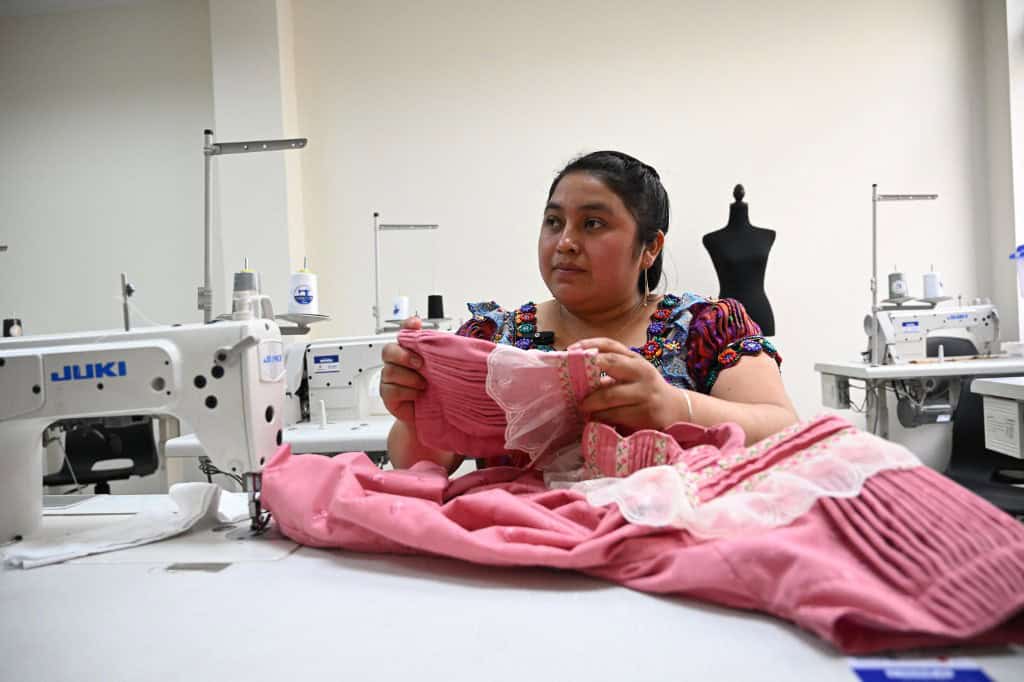Overwhelmed by poverty, Francisca Lares thought about emigrating from Guatemala. However, she learned tailoring and discarded that idea. Now she is glad she didn’t go to the United States, as she believes she would have been deported by the government of Donald Trump.
This 30-year-old single mother learned her craft at the “Quédate” (Stay) training center, which is designed to help young Guatemalans find employment or start their own businesses, encouraging them to forgo emigration. “One starts to think (…) what if I had left and then got deported, and with the debt I’d have (owed to the migrant traffickers), how am I going to pay it?” reflects Lares, dressed in a colorful K’iche’ Maya outfit in the indigenous municipality of Joyabaj, in western Guatemala.
According to an official from the training center, migrant traffickers or “coyotes” charge nearly 20,000 dollars to take a person from this impoverished area, surrounded by hills in the department of Quiché, to the United States. Thanks to a scholarship, Lares learned tailoring and now makes huipiles (Maya blouses), which she sells in a small shop at her home in the village of Estanzuela. She also offers them on social media and has even sent some garments to the United States.
“Thank God the scholarship came into my life (…) that is what made me stay here and say: I can get ahead,” the woman said.
Let’s Spare Ourselves the Suffering
Before receiving training, Lares earned 75 dollars a month making hand-woven fabrics, barely making it to the end of the month. Now she manages to cover her needs and those of her two daughters, aged 5 and 9, without major difficulties, although she did not disclose her current income.
Lares advises against the dangers of emigrating: “Some people die” during the journey, she recalls. “Let’s spare our families the suffering,” she says amid the sewing machines at the training center. Poverty is one of the main drivers of emigration in Guatemala and affects 56% of the country’s 18 million inhabitants, according to official figures, although the percentage is even higher in indigenous villages.
For this reason, many attempt to leave for the United States, where 3.2 million Guatemalans are settled, hundreds of thousands of them irregularly, according to the Central American country’s government. The remittances that migrants send to their families play a significant role in Guatemala’s economy: they amounted to 21.51 billion dollars in 2024, nearly 20% of the GDP.
Better to Stay
The training program was implemented in 2021 by the International Organization for Migration (IOM). In Joyabaj, classes are held at the “Quédate” center, run by the Guatemalan presidency, and deported young people also participate.
Japan donated four million dollars to construct and equip a new building, inaugurated in January, where students learn tailoring, baking, barbering, computer repair, and other trades that hold potential for employment or entrepreneurship, according to the IOM.
Pedro Miranda, the director of the Joyabaj training center, explained that the goal for 2025 is to train more than 600 young people. “Our people who migrate sometimes spend between 100,000 to 150,000 quetzals (12,500 to 18,750 dollars) paying a guide or ‘coyote’,” Miranda told AFP. “Why don’t they invest that money?” he wonders, suggesting it could be better spent in Guatemala.
“Now, because of the news in the United States, people in Joyabaj are waiting (to see) what will happen (…). They don’t want to take the risk also because they know that if they go, there is a 90% probability that they will be deported back to their country,” he adds. Similar centers exist in Huehuetenango and Sololá, also in western Guatemala.
Better to Stay
Marleny Tiño, originally from the municipality of Zacualpa, also considered emigrating. However, it was her husband who eventually left, and he now lives in Florida “in fear” of being deported, recounts the 25-year-old woman who also makes huipiles. “I tell him: my love, don’t be sad there. Any day now (…), God forbid, but if they catch you, you come back,” Tiño says at the sewing workshop.
“It’s better to stay here than risk your life going there and then just upon arrival get deported,” adds this mother of two children, aged 5 and 10, who runs her business from her home in the Tunajá community. Last year, according to the government of the Central American country, the United States deported 61,680 Guatemalans.






